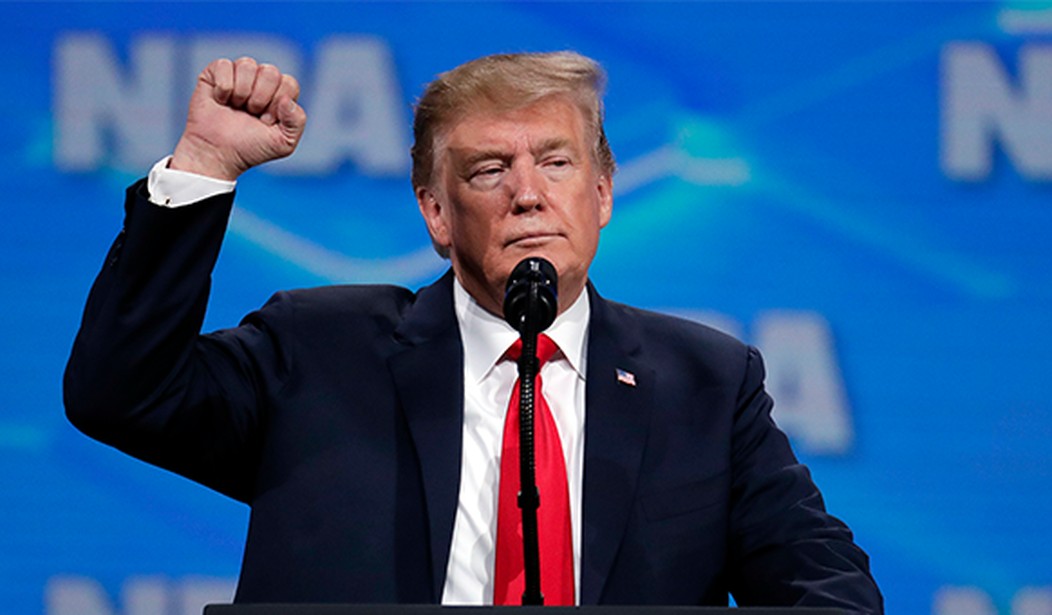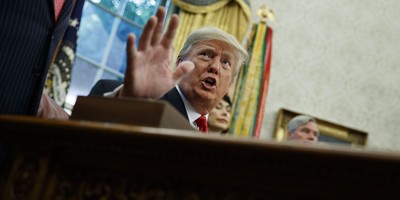Lost in the news about President Trump’s purported “trade war” with China and the effective ban on Chinese telecom giant Huawei is that Trump’s push to encourage consumers to “buy American” will be getting some help in Congress.
When Trump instituted new controversial tariffs on Chinese goods last week, critics decried the move, reiterating a mantra that has become a battle cry in recent weeks for those who see themselves as anti-protectionist: tariffs are a tax on consumers.
The president, no doubt aware of the criticism, tweeted a response that suggested his tariff approach only harms consumers who insist on buying Chinese-made goods.
...completely avoided if you buy from a non-Tariffed Country, or you buy the product inside the USA (the best idea). That’s Zero Tariffs. Many Tariffed companies will be leaving China for Vietnam and other such countries in Asia. That’s why China wants to make a deal so badly!...
— Donald J. Trump (@realDonaldTrump) May 13, 2019
This “buy American” economic approach isn’t just about weathering a trade war (one that China looks to potentially have a hard time winning). In fact, investing in American manufacturing has been a platform of Trump’s since before he was elected and was a major part of his platform in the 2016 election.
Buy American & hire American are the principles at the core of my agenda, which is: JOBS, JOBS, JOBS! Thank you @exxonmobil.
— Donald J. Trump (@realDonaldTrump) March 7, 2017
As much as critics of the Trump trade plan believe the president has never met a tariff he didn’t like, their assumptions were challenged Friday when the administration announced it was lifting tariffs on aluminum and steel coming in from North American neighbors — and possible future trading partners if the USMCA trade deal obtains Congressional approval — Mexico and Canada.
Recommended
The United States agreed Friday to lift its tariffs on industrial metals from Mexico and Canada, clearing a major obstacle to congressional passage of President Trump’s new North American trade deal.
The bargain calls for Mexico and Canada to adopt tough new monitoring and enforcement measures to prevent subsidized Chinese steel from being shipped to the United States via their territory. In return, the United States will lift its tariffs in 48 hours.
The newest move would appear to signal the trade dispute with China is less about philosophy that embraces tariffs and more about broadcasting which trade partnerships are preferred under Trump.
And the president is already getting help from some Congressional members such as Florida Senator Marco Rubio (R), who penned an op-ed for The Washington Examiner that tackled a lack of investment in the American economy. Rubio writes that the American economy is suffering from a philosophical shift that prioritizes “high returns to [financial] investors in the short term, rather than investment in long-term capabilities” has led to an economy “driven by finance [rather] than innovation in the production of real assets.”
While the Florida senator’s op-ed doesn’t explicitly echo Trump’s call to “buy American,” it does specifically call for investment into the American economy to ensure it can compete globally.
There are also new bills being introduced in both the House and Senate that explicitly seek to strengthen the American economy by making sure manufacturers are not abusing the waivers that allow them to circumvent existing “Buy American” laws.
Sen. Rob Portman (R-OH) unveiled the BuyAmerican.gov Act on May 2 with U.S. Sen. Chris Murphy (D-CT). Reps. Mike Bost (R-IL) and Dan Lipinski (D-IL) introduced the House version of the bill. Under current Buy American laws, federal agencies may use “domestic content waivers” to purchase goods or services from foreign companies if “U.S.-produced goods are not available in sufficient quantity and of satisfactory quality to meet the needs of the agency; the price of U.S.-made products are unreasonable; or the agency determines that the purchase of foreign-made products would be in the public interest.”
However, no government-wide system currently exists to track the use and abuse of these waivers by federal agencies.
If enacted, the bill would permit manufacturers and others to identify contract opportunities and hold federal agencies accountable for abusing Buy American waivers. Manufacturers also could challenge pending waivers sought by federal agencies, according to a statement from Sen. Portman’s office.
“Unfortunately, in the last five years alone, U.S. federal agencies have spent about $34 billion on goods manufactured by foreign firms, resulting in contracts and jobs lost to overseas competitors,” said Sen. Portman. “By improving transparency, the BuyAmerican.gov Act will encourage federal agencies to support American workers and American jobs by faithfully complying with Buy American laws.”
Portman’s act would also help solidify Trump’s 2019 Buy American Executive Order, itself at least the second order issued by the president in his term explicitly meant to encourage a push toward consumption of American-made goods.
In short, Trump’s negotiations with China over trade are not a reaction to anything China may or may not be doing within trade talks. They are, instead, the steps of an already well-laid plan that seeks to make the American economy self-sufficient again. And China is playing catch up.
Sarah Lee is a freelance writer and policy wonk living and working in Washington, DC.

























Join the conversation as a VIP Member